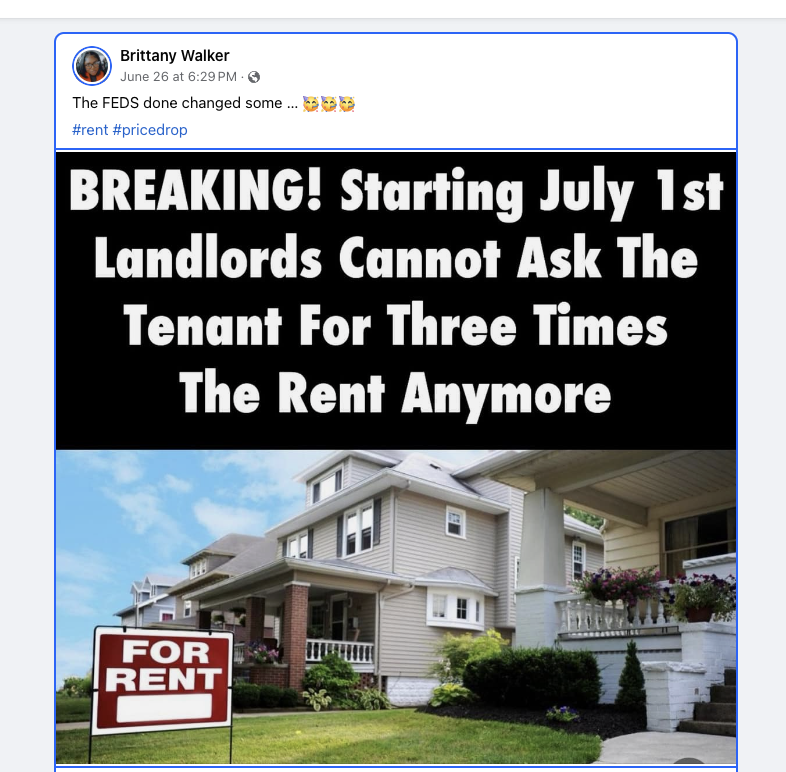
Did the federal government introduce a nationwide ban on security deposits equal to three months' rent starting on July 1, 2024? No, that's not true: The fact that such laws went into effect in at least two states on this day does not make those laws federal. The website of the U.S. Congress showed no legislation corroborating the claim. Three federal agencies confirmed to Lead Stories there was no such federal ban.
The claim appeared in a post (archived here) on Facebook on June 26, 2024. It opened:
The FEDS done changed some ...
The image shared in the post continued:
BREAKING! Starting July 1stLandlords Cannot Ask TheTenant For Three TimesThe Rent Anymore
This is what it looked like on Facebook at the time of writing:
(Source: Facebook screenshot taken on Mon Jul 1 14:38:45 2024 UTC)
The post implied that the federal government outlawed security deposits equal to three months' rent across the country and that this measure went into effect on July 1, 2024.
However, the claim was not grounded in facts.
Lead Stories searched the website of the U.S. Congress to identify any bills passed into law that could have potentially set a July 1, 2024, deadline for the supposed federal limit on security deposits but found no such legislation.
Had the alleged federal law uniformly regulating the matter across the country existed, there would be public announcements about it, but no credible sources indexed by Google News (archived here) reported that on July 1, 2024, either.
A spokesperson for the U.S. Department of Housing and Urban Development told Lead Stories via email on July 2, 2024:
This is not true.
Representatives of the Federal Housing Finance Agency (FHFA) and Consumer Financial Protection Bureau (CFPB) -- two other federal entities also mentioned in the January 2023 White House summary of the administration's actions aimed at renters' protection (archived here) -- also told Lead Stories via email on July 1 and July 2, 2024, that they were not aware of any recent federal action banning deposits equal to three months' rent.
Though a blueprint for a Renters' Bill of Rights (archived here) published by the Biden White House in January 2023 pointed out the need for a "transparent policy regarding security deposits," and said that those deposits should be "appropriately sized," that document wasn't a legally binding federal law and did not recommend any particular limits.
The specific date mentioned in the claim on social media -- July 1, 2024 -- corresponds with a 2022 California state bill (archived here) that became law in October 2023. It reads:
This bill would, beginning July 1, 2024, ... prohibit a landlord from demanding or receiving security for a rental agreement for residential property in an amount or value in excess of an amount equal to one month's rent, regardless of whether the residential property is unfurnished or furnished, in addition to any rent for the first month paid on or before initial occupancy.
On the same day -- July 1, 2024 -- Georgia (archived here) also started enforcing a ban on three-month rent deposits, limiting their size to the equivalent of two months' rent.
However, as of this writing, some states like Nevada (archived here) still allowed security deposits of this size and some other states like Ohio (archived here) did not specify the maximum amount.


















